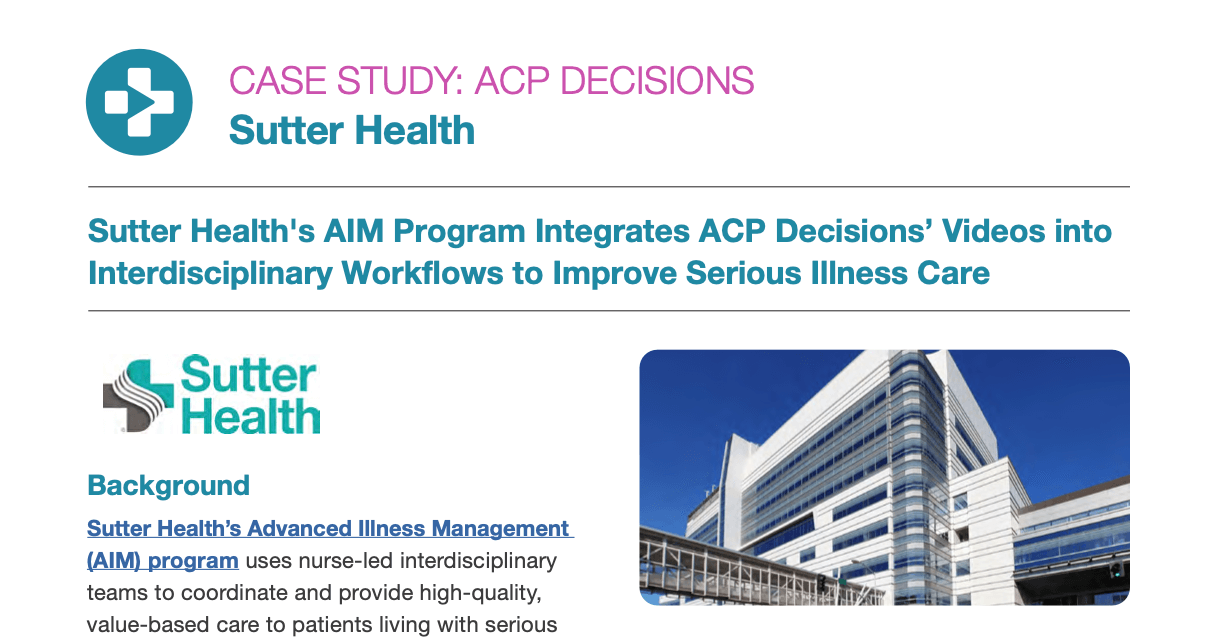IMPLEMENTATION | July 28, 2022
Getting Reimbursed for Advance Care Planning
Reading Time: 4 minutes

People who have a serious illness or are facing the end of life may be unable to make their own decisions about the medical treatment and care they want. Unfortunately, only an estimated one-third of Americans have any type of advance directive on file so their healthcare providers can carry out their end-of-life care wishes.
Advance care planning (ACP) is a process that helps align medical treatment and care with an individual’s preferences, values, and goals. Healthcare providers can get reimbursed by Medicare (and possibly other payers) for the time they spend planning end-of-life care with their patients; however, many are not billing for this valuable service. Clinicians who do not bill for ACP not only miss out on deserved revenue, but also the opportunity to provide care that has many evidence-based benefits for healthcare systems, providers, patients, and their families. Here are answers to the most common questions about how to get reimbursed for providing ACP services.
1. Who can Provide and be Reimbursed for ACP Services?
Physicians (any specialty), clinical nurse specialists (CNSs), nurse practitioners (NPs), and physician assistants (Pas) who are authorized to bill Medicare for Current Procedural Terminology (CPT) services can be reimbursed using the ACP CPT codes. The provider billing the codes must be the patient’s “managing physician” or be directly supervising a qualified health professional who engages in an ACP conversation with the patient. Medicare “incident to” rules apply, which means a non-billing medical team member, such as a registered nurse or social worker, can help deliver part of the service under the direct supervision of the billing provider if all applicable state law and scope of practice requirements are met.
2. What CPT Codes are Used to Bill for ACP Services?
There are two time-based CPT codes providers can use to report ACP services:
- 99497 – First 30 minutes (minimum of 16 minutes) of face-to-face ACP with the patient, family member(s) and/or surrogate provided by the physician or qualified healthcare professional. This may include the explanation and discussion of advance directives such as standard forms. Completion of an advance directive is only required “when performed” – it is not a requirement for billing ACP services.
- 99498 – An add on code for each additional 30 minutes (minimum of 16 minutes past the first 30 minutes documented) of face-to-face ACP. This code is listed separately in addition to the code for primary procedure.
For ACP services that last less than 16 minutes, CMS suggests billing a different evaluation and management (E/M) service, such as an office visit. To bill both codes together, the ACP conversation must last 46 minutes or more. There are no limits on the number of times or how frequently ACP services can be provided for a Medicare beneficiary. Per CMS: “When the service is billed multiple times for a given beneficiary, we would expect to see a documented change in the beneficiary’s health status and/or wishes regarding his or her end-of-life care.” For reimbursement rate information, please consult CMS’ Physician Fee Schedule.
3. Does Medicare Reimburse for ACP Conversations Conducted via Telehealth?
Policy and regulatory flexibilities that were granted under the COVID-19 public health emergency declaration have allowed providers to bill for ACP services conducted via telehealth, although there is much uncertainty around how long the coverage and reimbursement will last.
4. In Which Care Settings can ACP Services be Billed?
ACP services can be provided and billed for in any care setting, including a physician’s office, hospital, skilled nursing facility, home, and via telehealth so long all applicable state law and scope of practice requirements are met. The place of service (POS) must be reported when billing with the CPT codes. There are special billing considerations for hospice facilities, federally qualified health centers and rural health clinics, and the program for all-inclusive care for the elderly (PACE).
5. Does Private Insurance Reimburse for ACP Services?
Medicare Advantage and other health insurance plans may pay for ACP. It is not uncommon for other payers to adopt Medicare reimbursement rules. If a patient is enrolled in a Medicare Advantage plan or has private insurance, providers should confirm coverage. If a payer covers ACP services but does not reimburse for CPT codes 99497 and 99498, these services are subject to the insurance carrier’s billing policies.
6. How Much do Patients Pay Out of Pocket for ACP?
If ACP is part of the patient’s Medicare Annual Wellness Visit (AWV) or preventive services (billed with modifier -33), the patient has no out-of-pocket responsibility. Medicare coinsurance and deductibles apply for any ACP services provided outside the AWV. ACP services are optional, so if a patient elects to receive them, they should be informed if there is an out-of-pocket obligation.
7. What Documentation is Required for Reimbursement of ACP?
To ensure proper reimbursement, documentation should include:
- Time spent with the patient/family member/surrogate, separate from other services on the same date of service
- Who took part in the ACP session, including authorized providers
- Patient/family member/surrogate agreement to participate in ACP
- Presence of an advance directive, healthcare proxy, or medical orders, if completed
- What was discussed during the ACP session
Additional Resources
- Advance Care Planning Guide Part 1: Glossary of Terms
- Advance Care Planning Guide Part 2: List of Resources
- Billing and Coding: Advance Care Planning (CMS)
- Medicare information website
- Advance Care Planning MLN Fact Sheet
- Physician Fee Schedule (CMS)
Are you interested in offering advance care planning services to your patients? We can help. Contact us today to learn more!
Please note: The information provided in this blog post is an overview and based on our best understanding of Medicare reimbursement for ACP as of the published date. It does not guarantee payment. Healthcare providers and organizations should consult with their local billing expert for specifics on CPT code reporting, billing, and reimbursement.
You might also like...

Sutter Health’s AIM Program Integrates ACP...
CASE STUDIES, IMPLEMENTATION | < 1 MIN READ


